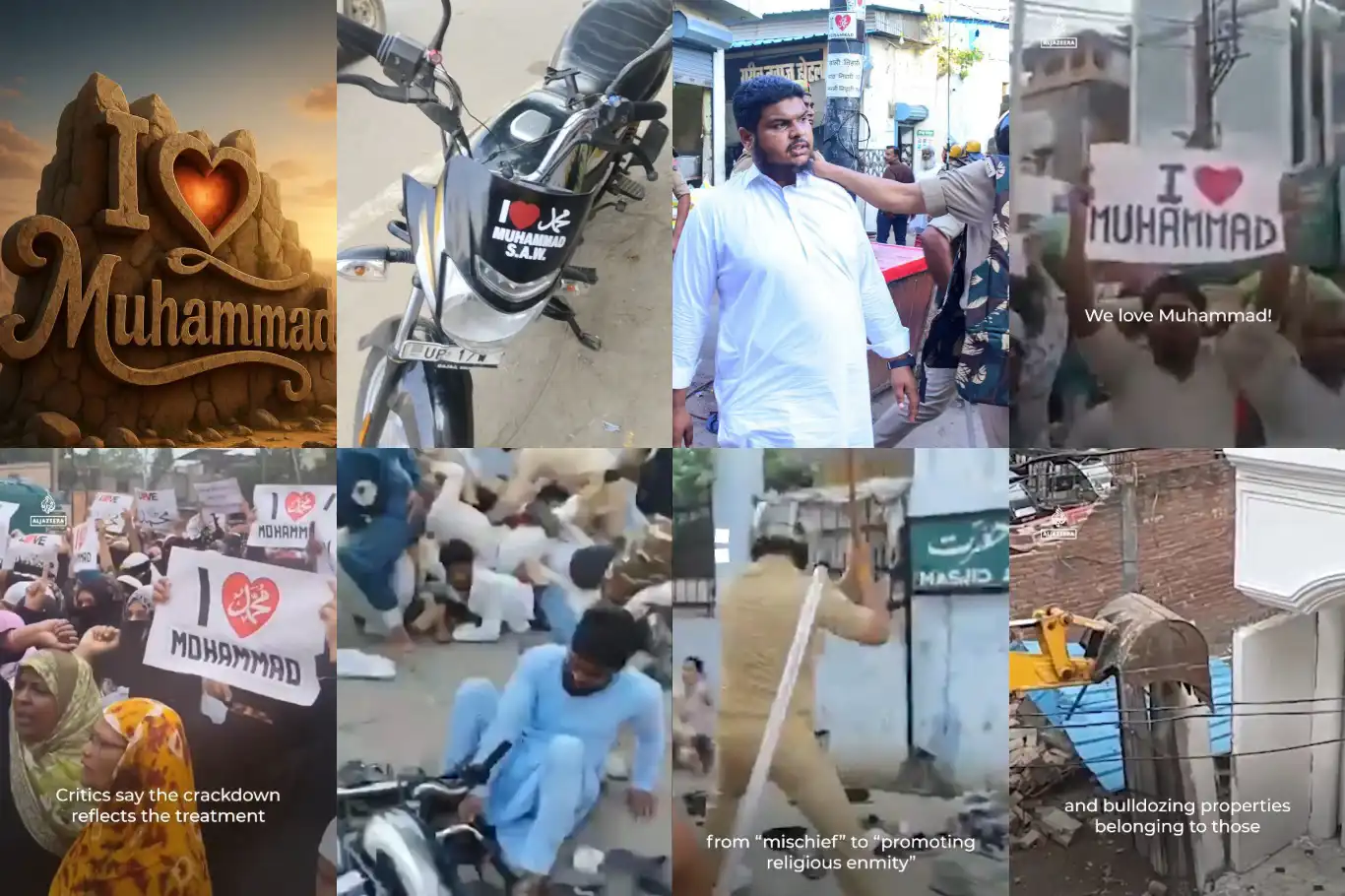India widens crackdown on Muslims over “I Love Muhammad” chant


Since early October, Indian authorities have arrested thousands of Muslims, demolished buildings in their neighborhoods and imposed internet shutdowns in areas where the slogan “I Love Muhammad” has prominently appeared on banners, T-shirts and social-media posts.
Officials cite concerns of public order; rights activists and analysts argue the campaign is part of a broader, targeted crackdown on India’s Muslim minority.
The first incident took place on 4 September in Kanpur, in the northern state of Uttar Pradesh, during the festival of Milad-un-Nabi (the birth of the Prophet Muhammad). Local Muslims installed an illuminated sign reading “I Love Muhammad”; some Hindu residents objected, saying the display escalated a traditionally subdued celebration. Police later filed criminal cases under charges of promoting religious enmity and disturbing communal harmony.
What followed was a rapid national trigger: young Muslims in other cities adopted the slogan as an assertion of faith and identity, while authorities began arresting demonstrators and tearing down banners. According to data from the Association for Protection of Civil Rights (APCR), from the first incident in early September through 23 September at least 21 FIRs (First Information Reports) were filed, over 1,324 Muslims booked and 38 arrested across Uttar Pradesh and other states. By a report released on 10 October, APCR said around 4,505 Muslims had been officially charged and 265 arrested across India — including 89 in the city of Bareilly alone.
In Bareilly, tensions escalated after a demonstration led by imam Tauqeer Raza Khan on 26 September. The following day police arrested 75 people — including Khan, his relatives and aides. Authorities then demolished four properties linked to the accused, without prior warning or visible court orders.
The practice of using demolition-drives as punitive measures — dubbed “bulldozer justice” — has become widespread, particularly under the governance of the ruling Bharatiya Janata Party (BJP) in several states. Rights organisations including Amnesty International have condemned the tactic as “an aggravated form of human rights violation”, especially when targeted against minorities. In September 2024 the Supreme Court of India ruled that demolishing properties without due process purely on the basis of alleged criminal involvement is unconstitutional.
While the slogan “I Love Muhammad” itself does not violate any Indian laws, police have used a range of indirect legal justifications — unlawful assembly, inciting enmity, disturbing public order — to detain those who display it. Critics highlight a stark contrast in the enforcement of public religious expression: Hindu religious processions are often supported or tolerated — sometimes even celebrated with helicopter-flower showers — while Muslim displays are frequently removed or restricted.
Beyond the slogan row, new legislative and regulatory moves have amplified concerns among Muslims about their rights. For example, The Waqf (Amendment) Act, 2025 grants the state greater control over Muslim religious endowments (waqf properties), empowering district officials to intervene and potentially dispossess Muslim trusts of historic assets. Many Muslim organisations describe it as an attempt to undermine their religious and charitable institutions.
Large-scale demolition and eviction drives in BJP-ruled states continue to disproportionately affect Muslim households, even where documentation is in order. A 2024-25 report by Amnesty found that in a sample of 63 demolitions in five states, many Muslim-owned properties were destroyed while neighbouring Hindu properties remained intact.
Rights defenders say the authorities have resorted to “collective and arbitrary punishment” of Muslims through arrests, demolitions and internet shutdowns — measures that can violate rights to due process, freedom of religion and free expression. Amnesty’s Aakar Patel said: “It is absurd that the state should target people for saying ‘I Love Muhammad’, which is a peaceful expression and devoid of any incitement or threat.” He added that public-order concerns must be addressed proportionately, and cannot justify blanket suppression of religious identity or expression.
The Pakistani foreign ministry recently criticised India for “deliberate incitement” against its Muslim minority, citing state complicity in discriminatory actions — a comment that underscores the wider regional diplomatic sensitivity.
With state elections approaching in several BJP-ruled states, observers warn that such crackdowns may become more frequent, used as tools of political mobilisation or signalling majoritarian strength. Meanwhile, affected families remain in limbo — arrested relatives, demolished homes, interrupted incomes and the fear of further targeting.
For many Muslims in India, the slogan “I Love Muhammad” has become much more than a declaration of faith: it is now a flashpoint in a larger debate about religion, citizenship and state-power in contemporary India. (ILKHA)
LEGAL WARNING: All rights of the published news, photos and videos are reserved by İlke Haber Ajansı Basın Yayın San. Trade A.Ş. Under no circumstances can all or part of the news, photos and videos be used without a written contract or subscription.
Two Polish fighter jets intercepted a Russian Ilyushin Il-20 reconnaissance aircraft flying over the Baltic Sea on Tuesday, the Polish Armed Forces announced.
United Nations investigators have declared that Israel’s military and political leadership bear direct responsibility for war crimes, crimes against humanity, and acts of genocide committed against Palestinians in Gaza since October 2023.
UNICEF warns that hundreds of thousands of children remain deprived of food, clean water, and education as Gaza struggles to recover from massive destruction.